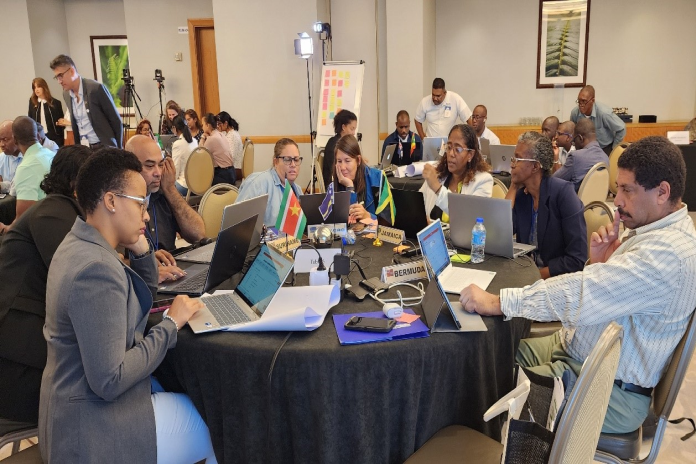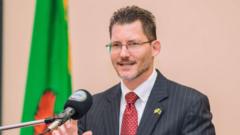 PORT OF SPAIN, Trinidad – In an essential step toward enhancing animal health management, food safety, and food security in the region, over 100 Caribbean stakeholders from 19 countries completed training on using the World Animal Health Information System (WAHIS). Held on March 27-28, 2025, at the Hyatt Regency Trinidad in Port of Spain, the training provided an unparalleled opportunity for participants to strengthen their expertise in disease reporting, risk management, and biosecurity measures.
PORT OF SPAIN, Trinidad – In an essential step toward enhancing animal health management, food safety, and food security in the region, over 100 Caribbean stakeholders from 19 countries completed training on using the World Animal Health Information System (WAHIS). Held on March 27-28, 2025, at the Hyatt Regency Trinidad in Port of Spain, the training provided an unparalleled opportunity for participants to strengthen their expertise in disease reporting, risk management, and biosecurity measures.
This training marked another step in the collaborative effort among the Inter-American Institute for Cooperation on Agriculture (IICA) in collaboration with the United States Department of Agriculture (USDA), the World Organisation for Animal Health (WOAH), the Caribbean Agricultural Health and Food Safety Agency (CAHFSA) and Caribbean Animal Health Network (CaribVET), to advance the region’s capacity to detect, report, and manage animal disease threats. High among these threats are transboundary animal diseases such as the African Swine Fever (ASF) and Avian Influenza, which affect the swine and poultry industries, respectively.
A game-changer for regional animal health management
WAHIS is an internationally recognised platform to enhance disease monitoring and notification. This system enables WOAH member and non-member countries to respond swiftly and effectively to outbreaks. The updated WAHIS platform also allows the private sector to report animal health risks.
According to Dr Tiffany Chisholm, senior veterinary officer, department of agriculture, Cayman Islands Government: “A key challenge to surveillance and reporting on animal diseases is limited human resources. Our ability to navigate the WAHIS interface will assist in determining response needs during outbreaks, expediting report submissions and staying connected with neighbouring islands. Collaboration across Caribbean countries is vital due to the high risk of disease transmission and essential to mitigate that risk.”

Empowering participants with knowledge and expertise
Participants welcomed the training, highlighting its practical value and the significant improvements it would bring to national disease surveillance. Many noted that the insights gained would enhance reporting mechanisms, ensuring greater transparency and robustness.
Dr Lisa Musai, National Focal Point for Animal Diseases Notification and chief veterinary officer, ministry of agriculture, land and fisheries, government of the Republic of Trinidad and Tobago, confirmed the significance of the training in “enhancing Trinidad and Tobago’s ability to report animal health data in a timely and efficient manner. By strengthening our national reporting systems, we’re enhancing both food safety and our credibility in international trade. This localised approach enables us to effectively manage risks and challenges specific to our region, reinforcing our position as a trusted partner in the global agricultural market while safeguarding the health of our population.”
Ensuring animal health is crucial to protecting livestock production and enhancing their capacity to contribute to the Region’s food and nutrition security and rural livelihood objectives. Left unattended, emerging agricultural health threats, pests, and diseases can decimate food production systems, worsening climate change, supply chain, and food price challenges. Strengthening disease surveillance and reporting systems through platforms like WAHIS, which enable accurate and timely disease reporting, is crucial to protecting the livestock industry, supporting regional producers, and maintaining consumer trust in local food systems.
Diana Francis, IICA representative in Trinidad and Tobago, emphasised that: “In today’s data-driven world, strong information systems are critical, and Artificial Intelligence (AI) is playing an increasing role in improving disease monitoring and response to threats that do not recognise borders or economic status. IICA remains fully committed to collaboration on animal health within the One Health framework.”
The post Managing animal health in the Caribbean: WAHIS training boosts trade and resilience appeared first on Caribbean News Global.
